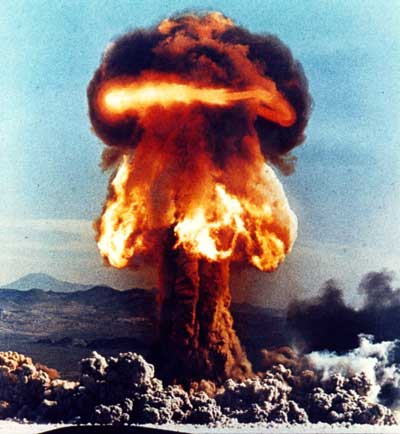
Commemorating the International Day Against Nuclear Tests
 August 29th is a rather inconspicuous day.
August 29th is a rather inconspicuous day.
Next Monday, September 3rd, marks Labor Day for the US and Canada. Hot dogs will be grilled, baseball will be watched, and Americans will go swimming.
Last week hundreds of millions of Muslims just celebrated Eid al-Fitr marking the end of the holy month of Ramadan.
Rosh Hashanah – the Jewish New Year – begins in a couple of weeks culminating in Yom Kippur.
August 29th however, is International Day Against Nuclear Tests. Not exactly Christmas, but nonetheless an important day of which Americans should take note.
The International Day Against Nuclear Tests is an appropriate time to reflect on the importance of ratifying the Comprehensive Test Ban Treaty.
The U.S. has conducted over 1,000 nuclear tests, the last on September 23rd, 1992. (The American Security Project is marking the 20th anniversary of the last US nuclear test with an event featuring Acting Undersecretary of State for Arms Control and International Security Rose Gottemoeller).
In the absence of nuclear testing, the U.S. ensures the safety and security of its nuclear arsenal through a robust Stockpile Stewardship Management Program. Under SSMP the nation’s nuclear labs conduct a wide range of experiments and assessments to maintain the U.S. nuclear arsenal
The SSMP has been so successful that the National Academy of Sciences concluded in a recent report that, “provided that sufficient resources and a national commitment to stockpile stewardship are in place…the United States has the technical capabilities to maintain a safe, secure, and reliable stockpile of nuclear weapons into the forseeable future without nuclear-explosion testing.”
Despite the clear evidence that of the security of the U.S. nuclear arsenal, The US is one of several countries, including China, Egypt, Iran, Israel, Pakistan, India and North Korea, that have yet not ratified the CTBT.
As ASP CEO General Stephen Cheney recently noted, ratifying the CTBT would enhance U.S. national security by strengthening the international consensus against nuclear proliferation.
August 29, 2012 should be a day in which people take notice of how dangerous nuclear weapons really are. It should be a day in which policy makers, scholars and senior military leadership press for ratification of treaty that the US has observed in essence for 20 years.







[…] Commemorating the International Day against Nuclear Tests […]